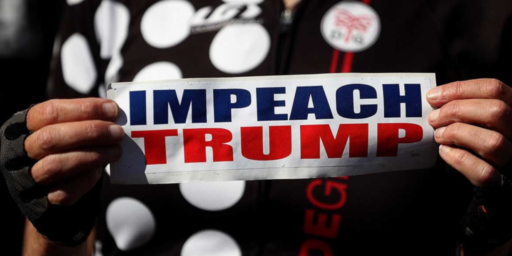Takeaways From the Takeaways
It's not all about Trump.

Yesterday featured Republican primaries in South Carolina, Nevada, Texas, Maine, and North Dakota. Naturally, the analysis is mostly focused on a certain orange-haired former Toddler-in-Chief.
WaPo’s Aaron Blake (“4 takeaways from the elections in Texas, South Carolina and Nevada“):
1. The first impeachment casualty, but a split Trump verdict
After a bit of a break in the Trump storyline last week, Tuesday presented some particularly tantalizing primary results to compare and contrast, with the two biggest ones in coastal South Carolina districts.
Reps. Tom Rice (R-S.C.) and Nancy Mace (R-S.C.) both made big breaks with President Donald Trump after the Jan. 6, 2021, attack on the U.S. Capitol. Rice was perhaps the most surprising among the 10 GOP votes for impeachment. Mace denounced Trump as strongly as just about anyone in her party.
Then they diverged. Mace pulled a 180, even cutting a campaign video in front of Trump Tower, aligning with Trump when the former president endorsed her primary opponent. Rice, on the other hand, completely owned his impeachment vote and tried to explain it to his conservative district as a vote of conscience.
It worked for Mace. It didn’t for Rice.
Rice lost to Trump-backed state Rep. Russell Fry more than 2 to 1, with Fry taking the majority needed to avoid a runoff. Rice was below 25 percent.
Mace, though, won — leading Trump-backed former state representative Katie Arrington 53 percent to 45 percent with about 98 percent of the vote in.
Clearly, Trump can mobilize the base against an incumbent, but Arrington is the second House candidate he endorsed to lose a primary, after Rep. Madison Cawthorn (R-N.C.). Trump’s endorsement record in competitive races remains decidedly split.
On the plus side for Trump, Rice is the first impeachment supporter to go down. And after Rep. David G. Valadao (R-Calif.) got a real scare last week — despite Trump not backing his GOP opponent — it doesn’t look good for their ilk.
[…]
4. More surprising GOP incumbent struggles
While the Mace and Rice results made sense, given all we know, they weren’t the only ones flirting with trouble in Tuesday’s primaries. So, too — more surprisingly — was Rep. William Timmons (R-S.C.).
Timmons was taking less than 53 percent of the vote with 99 percent of the vote in — startlingly close to runoff territory. He led his race by nearly 30 points, but he wasn’t expected to be in any real danger given his lack of a comparable move to alienate the conservative base.
Timmons did face a prominent Trump ally in Mark Burns, a pastor, but Trump endorsed Timmons. Timmons was also ceding substantial votes to a relative unknown in Michael LaPierre.
In some ways, the results in South Carolina echo what happened in Mississippi last week, when multiple incumbents found themselves in trouble, including one rather unexpectedly. But at least in that case, we could trace it to Republican Rep. Michael Guest’s vote for an independent 9/11-style Jan. 6 commission.
POLITICO staff (“Trump takes down his first impeachment victim: 5 takeaways from a big primary night“):
Here are five takeaways from a night that tested the power of Trump, incumbency and anti-establishment fervor on the right:
Impeachment is a killer
If we’ve learned anything from this year’s primaries, it’s that Trump isn’t invincible. Brian Kemp and Brad Raffensperger both thumped Trump-endorsed challengers in Georgia. A handful of House Republicans who voted to create a bipartisan commission to investigate the Jan. 6 riot at the Capitol survived in last week’s primaries. And on Tuesday in South Carolina, Rep. Nancy Mace, despite her criticisms of the former president, was running ahead of her Trump-backed challenger.
But if there’s a limit to how severely a Republican can cross Trump, the other closely-watched House race in South Carolina appeared to lay it bare. Tom Rice, the representative who voted to impeach Trump and never backed off his criticism of him, lost his primary to Trump-endorsed state Rep. Russell Fry.
[…]
For the remaining House candidates who voted to impeach Trump — and who have not retired — the result is foreboding. Rice and his family suffered through personal turmoil, death threats and hate mail, only to see a brutal loss to a Trump-backed foe. Few would want to follow his path.
But Rice was perhaps worse off than many of the others who chose to impeach. Reps. Peter Meijer (R-Mich.), David Valadao (R-Calif.) and Jaime Herrera Beutler (R-Wash.) all have somewhat moderate districts where Democrats and independents might support their decision. Herrera Beutler and Reps. Dan Newhouse (R-Wash.) also have all-party primaries that could offer some cushion.
Rice had to face an angry GOP base with little buffer.
[…]
Trump’s the establishment now
Adam Laxalt had the backing of Trump and a host of prominent national GOP leaders and groups, and he may be fine in his bid to represent Nevada in the Senate. But no matter what the final tally may be, it wasn’t expected to be this hard for a former state attorney general with a political pedigree.
Sam Brown, the wounded Afghanistan veteran and anti-establishment outsider, secured the endorsement of the Nevada Republican Party this spring, and Laxalt and his allies were forced to scramble. In just the last three weeks, the Club for Growth has spent roughly $750,000 on television ads attacking Brown in an effort to shore up Laxalt’s support among Republicans. Laxalt brought Florida Gov. Ron DeSantis out to campaign with him in Nevada, and he received support from Trump last week in the form of a tele-town hall.
And for all of Laxalt’s big-name national support, he and Brown raised similar amounts throughout the primary, with Brown finding success with small-dollar donors.
While Trump remains wildly popular with the Nevada GOP — some 89 percent of Republican voters there view him favorably, according to the latest Nevada Independent poll — he still isn’t clearing most GOP primary fields in 2022.
CNN’s Eric Bradner (“5 takeaways from Tuesday’s elections in South Carolina, Nevada, Texas, Maine and North Dakota“):
Trump topples another intra-party critic in South Carolina House primary
The former President settled another political score in South Carolina, as Trump-endorsed state Rep. Russell Fry handily defeated Rep. Tom Rice in a Republican primary in Pee Dee.
Rice is the latest Republican purged from the party after breaking with former President Donald Trump in the aftermath of the insurrection at the US Capitol on January 6, 2021. Rice was one of 10 Republicans to vote to impeach Trump. He later became one of 35 Republicans to vote to create an independent commission to investigate the storming of the Capitol, which was ultimately blocked by Senate Republicans.Fry’s ouster of Rice underscores the political peril that faces many Republicans who have crossed Trump. Rice, a conservative Republican who was first elected in 2012, has faced death threats, a censure from his state party and attacks from Trump himself.
[…]
…But another one-time Trump critic survives his revenge effort
While Rice was getting walloped, another House Republican, Rep. Nancy Mace, narrowly survived a Trump-fueled primary challenge by former state Rep. Katie Arrington in her Lowcountry district.
One key difference between the South Carolina Republican who lost a House primary Tuesday and the one who survived: Rice voted to impeach Trump; Mace did not.Still, she had been fiercely critical of Trump in the aftermath of the January 6, 2021, insurrection at the US Capitol. “His entire legacy was wiped out yesterday,” she said of Trump in an appearance on CNN the next day.
Since then, Mace has tacked to the right. The month after the insurrection, she picked a Twitter fight with New York Rep. Alexandria Ocasio-Cortez, mischaracterizing the New York Democrat’s comments about the threat posed by rioters.
I don’t know enough about these candidates and the concerns of their constituencies to offer any deep insights into the particular contests. Still, as tempting as it is to analyze every GOP contest through the lens of Trump—Did he win? Did he lose?—it’s clearly more complicated than that.
The POLITICO team is clearly right that Trump and Trumpism have become the GOP Establishment. But that’s a different thing than him ruling the party by diktat. Local politicians who are popular with their constituents will almost certainly win over a Trump-endorsed rival. As much as we want to ascribe cult-like status to Trump and his supporters, we’ve known for decades that endorsements have a relatively marginal impact on voters.
That said, having voted to impeach a Republican President is naturally going to be very difficult to overcome in a Republican primary. While there are doubtless a large number of people who voted for Trump and will continue to vote Republican in the next election cycles who thought Trump deserved to be impeached after the Capitol Riot, they’re not the type likely to show up to vote in the primaries.
Similarly, it’s both disheartening and a bad portent for the integrity of our future elections that Big Lie enthusiasts are winning primaries to be state chief election officers. But, again, that’s as much the distorting impact of the primary system on our ostensible democracy as it is anything else. The most rabid partisans choose candidates and, alas, most districts and states are non-competitive. Even though, objectively, the Republican primary is the de facto general election in a whole lot of places, it just doesn’t attract the same turnout as the comparatively meaningless November contest that we’ve trained citizens to believe is the real election.






The notion that any given primary is some crystal ball is a notion that I wish the media would abandon, but they won’t.
Plus, the Trump scorecard notion is highly flawed since many of his endorsements are for shoe-ins anyway. For example,e he just endorsed Britt for Senate in Alabama over Brooks (whom he had at one time endorsed and then changed his mind). Britt is the odds-on favorite at this point, so what does the endorsement even mean? But it will give him a W for his tally!
Calling upon my observations from living in a deep red Republican county, I need to point out that the Republicans who are really determining the outcome of the primaries are the one who don’t vote. I understand the turn out of crazy energized Trump supporters, but I will never forgive the ones who don’t vote–regardless of party.
@Steven L. Taylor: On the off chance that this isn’t just a typo, I believe the phrase is “shoo in” with an etymology of literally shooing someone into a position before anything else can happen.
@Joe: I’ll own it as a straight-up mistake. I forgot the proper spelling.
@Steven L. Taylor: Ah yes, “Trump, the Texas Sharpshooter!”
@Steven L. Taylor:
The “w” for his tally is the point. Trump doesn’t do losers. If he endorses only sure winners, then he gets –or will take–credit for the win and he gets to ally himself with another winner.
I hope each day for a bit of news that will ease my sense of existential dread about politics in this country. Learning that Club for Growth backed Adam “Major Big Lie Promoter” Laxalt over a less insurrectionist GOPer in the Nevada Senate primaries makes this not a good day.
Indeed, FG does make a convenient bogeyman for the punditry and pseudo-good conservatives who want to believe that someday the teeming masses will be content with dog whistling again.
This plays a bigger role than we may realize, too. Perhaps the pseudo-good conservatives who want
dog whistling“normalcy” to return should concentrate on that part of the question.I read this to indicate you believe they will cheat if they win in the general and take office. Is that what you meant?
@Michael Cain: Yes. We were saved in 2020 because quite a number of Republican election officials refused to go along with the heist, putting their duty to the law over party. I have no confidence these guys will do the same.
@James Joyner: The courts, including the Supremes also put their duty to the law over party. But they were never presented with a case that could reverse the outcome. It’s generally unstated, but the 1/6 plan of getting Pence to accept fake electors ultimately depended on SCOTUS going along with it.
The “independent legislature doctrine” holds that a state legislature has absolute control over elections, unchecked by state courts, their governors, or even the vote count It tortures plain language in the Constitution in a way only a Calvinball Originalist could love. Alito, Thomas, and Gorsuch have endorsed it, with Kavanagh a maybe. Barrett hasn’t addressed it and there’s the hope that Robert’s has some concern for the Court’s integrity. I have no confidence in the Supremes should they have a chance to overturn the ’24 prez election for an R.
Maybe they are concentrating on that part of the equation and finding that it is a null set.
@Skookum:
It’s the key to Trump’s (and the NRA’s for that matter) that only a tiny proportion of the public chooses the party’s nominees. The party’s have abandoned the nomination process to raw populism.
The solution is forcing the public to participate via some method like the Aussies use, designated holidays for election with small fines for failure to show up, in order to bring more normal and dilute the chronic-outrage/single issue vote in primaries. A major roadblock to that is it requires legislative action, and legislatures are now populated with people who are successful at working the system as-is. They don’t want to even discuss the problem, to them it’s the opposite of a problem. It’s their meal-ticket.
To a degree it’s not a problem for media. They suck at the same teat. A great deal of money is spent generating outrage to “bring out the vote”, and it mostly goes to media. Their most profitable time is during elections, debating all sorts of outrage which brings political ad revenue and ratings. They never discuss election reform either.
@dazedandconfused:
“A major roadblock to that is it requires legislative action, and legislatures are now populated with people who are successful at working the system as-is. They don’t want to even discuss the problem, to them it’s the opposite of a problem. It’s their meal-ticket.”
The same roadblock is present in nearly all proposed solutions to our country’s gridlock. The people who would need to vote to change the situation are the ones who also gain from the current situation, and therefore have no reason to experiment with solutions to it.